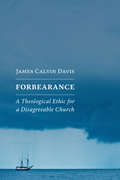- Table View
- List View
Foot Work: What Your Shoes Are Doing to the World
by Tansy E. HoskinsFrom the author of STITCHED UP: 'Makes a strong case for nothing less than a revolution' Emma Watson'A superb primer on everything that is wrong with our world - and how we can start to change it' NEW INTERNATIONALISTDO YOU KNOW WHERE YOUR SHOES COME FROM?DO YOU KNOW WHERE THEY GO WHEN YOU'RE DONE WITH THEM?In 2018, 66.3 million pairs of shoes were manufactured across the world every single day. They have never been cheaper to buy, and we have never been more convinced that we need to buy them. Yet their cost to the planet has never been greater.In this urgent, passionately argued book, Tansy E. Hoskins opens our eyes to the dark origins of the shoes on our feet. Taking us deep into the heart of an industry that is exploiting workers and deceiving consumers, we begin to understand that if we don't act fast, this humble household object will take us to the point of no return.
Foot Work: What Your Shoes Tell You About Globalisation
by Tansy E. HoskinsFrom the author of STITCHED UP: 'Makes a strong case for nothing less than a revolution' Emma Watson'A superb primer on everything that is wrong with our world - and how we can start to change it' NEW INTERNATIONALISTDO YOU KNOW WHERE YOUR SHOES COME FROM?DO YOU KNOW WHERE THEY GO WHEN YOU'RE DONE WITH THEM?In 2018, 66.3 million pairs of shoes were manufactured across the world every single day. They have never been cheaper to buy, and we have never been more convinced that we need to buy them. Yet their cost to the planet has never been greater.In this urgent, passionately argued book, Tansy E. Hoskins opens our eyes to the dark origins of the shoes on our feet. Taking us deep into the heart of an industry that is exploiting workers and deceiving consumers, we begin to understand that if we don't act fast, this humble household object will take us to the point of no return.(p) The Orion Publishing Group Ltd 2020
Football Society & The Law
by David McardleThis text provides a new dimension to the exciting and rapidly expanding field of sport and the law. David McArdle contemplates laws influence over the development of football between the founding of the English Football League in 1888 and the European Court of Justices seminal ruling in the Bosman case over a century later. From Boot Money to Bosman provides insights into how the law on violence and consent impacts upon acts of on-field violence,the courts role in securing players a greater degree of contractual freedom and the football governing bodies responses to player power. It also looks at the games, and the legislatures, attempts to prevent hooliganism and racism and considers the impact of the move towards all-seater stadia in the wake of the Hillsborough disaster. The book provides information on how race and sex discrimination law impact upon footballs employment practices, explains why the sports governing bodies are immune to public law remedies such as judicial review (but are possibly not immune the provisions of the Human Rights Act 1998) and exhorts footballs governing bodies to take the lead in participant protection initiatives. Lucid and thought-provoking, this book will be required reading for sports studies students and particularly those who are concerned with football and the law. It will also appeal to people working within the football industry and others who wish to understand how the law has influenced, and will continue to influence, the development of football.
Football Trafficking: A Legal Analysis of the Trade of African Minors
by Ini-Obong NkangThis book provides a comprehensive analysis of the illicit practice of football trafficking, focusing on the exploitation of underage African players being transferred to Europe. It delves into the broader context of human trafficking, examining relevant international laws and their application to football. Through critical analysis of FIFA’s regulatory framework, the book questions the effectiveness of the organisation’s current anti-trafficking policies and proposes actionable solutions for reform. By integrating theoretical insights with practical recommendations, the book outlines strategies such as Sport for Development and Peace (SDP) programmes and child-centred approaches to protect vulnerable young athletes and address some of the core factors that drive the occurrence of the crime.This book is an essential resource for scholars, policymakers, legal professionals, and stakeholders in the sports industry. It offers valuable insights into the complex interplay between sports, law, and human rights, making it particularly relevant for those interested in sports law, international law, and human trafficking prevention. Readers will benefit from the book’s in-depth exploration of the regulatory challenges at play and the array of proposed remedies, giving readers a deeper understanding of how to create a safer and more ethical environment for the at-risk youths involved in football globally.
Football's Fearless Activists: How Colin Kaepernick, Eric Reid, Kenny Stills, and Fellow Athletes Stood Up to the NFL and President Trump
by Mike FreemanFor the first time, here is the full story of the NFL player protests that rocked a nation and turned our country upside down. This is the players' side, one that has largely been ignored by the media.On September 1, 2016, Colin Kaepernick took a knee before a preseason game. Little did he, nor anyone else, know the ramifications from that decision. Since being exiled from the National Football League, Kaepernick has stood strong against all those who have attacked him. He and others who took a knee against racial inequality and police brutality have been ridiculed, mocked, threatened, and some have even lost their jobs. They have feared for their safety and that of their loved ones. But what made Kaepernick kneel, and the entire country turn a silent protest into a national pandemic? One person: President Donald Trump. For the first time, veteran journalist Mike Freeman sits down with those directly involved in the protests—the players—to find out how things really went down. Readers will learn why they decided to protest, how racism and the murdering of innocent men of color directly affected them, how the politics of protest affected their professional and personal lives, and if anything has even changed for the better. Including interviews with Colin Kaepernick, Eric Reid, Kenny Stills, Michael Bennett, Richard Sherman, and numerous others, see first-hand how the media, President Trump, and the National Football League took a peaceful message for change and turned it on its head. They changed the narrative, accusing these men of being &“anti-America,&” &“anti-military,&” and &“disrespecting the flag.&” In Football&’s Fearless Activists, Freeman offers an opportunity to understand what these protests meant to the players, and how the hatred from the media, President, NFL owners, and some Americans was not only unwarranted, but anti-American.
Football, Gambling, and Money Laundering
by Fausto Martin De SanctisProfessional football means many things to many people. For players, a means to possible fame and fortune. For fans, a source of local or national pride, and perhaps the chance to score with a few bets. For criminal organizations, a cover for making millions in corrupt enterprises. In the world of gambling this is no different. Football, Gambling, and Money Laundering describes in impressive detail the scope of the problem, the layers of denial that allow sports-related financial crime to flourish, and the steps that are being taken--and that need to be taken--to combat illicit operations in the sports world. Expert analysis explains criminal activity in the context of football, and how sports governing bodies, the media, and others have created a culture that regularly turns a blind eye. International data and instructive legal case examples shed light on the role of the Internet in the spread of gambling and money laundering as well as the strengths and weaknesses of current law enforcement, legislative, and sports-based efforts in fighting corruption. Included in the coverage: * Criminal activity in the sports world * Financial crime and exploitation in football and gambling * Legal wagering and illegal betting, including online * Illegal and disguised payment instruments used by organized crime * International legal cooperation in combating money laundering * National and international proposals for improving the sports and gambling industries to prevent money laundering An authoritative reference to a growing and wide-reaching concern, Football, Gambling,and Money Laundering will find an interested audience among academics, prosecutors, judges, law enforcement officials, and others involved in efforts to curb corruption and money laundering in the world of football.
Footprint and Entrepreneurship: Cases On Circular Economy And Entrepreneurship (Environmental Footprints And Eco-design Of Products And Processes Series)
by Subramanian Senthilkannan Muthu Aldo Alvarez-Risco Shyla Del-Aguila-ArcentalesThis book highlights ten cases of entrepreneurship that – in the context of circular economy – have redefined the paradigm of luxury and the notion of exclusivity that it requires. It shows how, by using technology and a new consumption model, the ten companies have created novel business models for luxury, and more intelligent forms of use better-suited to modern times.
Footwear Impression Evidence: Detection, Recovery and Examination, SECOND EDITION (Practical Aspects of Criminal and Forensic Investigations)
by William J. BodziakReviewed and recognized as the most authoritative source in the field, this book describes the methods used worldwide to recover and identify footwear impressions from the scene of a crime. In this new edition, everything, including the original twelve chapters, bibliography, appendix, etc., has been clarified, updated and expanded. This edition includes updated and new information on recovery procedures and materials such as lifting, photography and casting; chemical enhancement; updated information about footwear manufacturing; footwear sizing; and known impression techniques and materials. WHAT’S NEW IN THE SECOND EDITION: Besides updating and expanding the twelve original chapters, Footwear Impression Evidence: Detection, Recovery and Examination, Second Edition adds three new chapters: one chapter on barefoot evidence, which concerns impressions made by the naked or sock-clad foot or those which remain in abandoned or discarded footwear; another new chapter on several cases in which the footwear impression evidence was of primary importance in bringing about a conviction or confession; and finally, a new chapter on the footwear impression evidence in the O.J. Simpson criminal and civil cases.
For Business Ethics
by Martin Parker Campbell Jones Rene ten BosFor Business Ethics is a daring adventure into the world of business ethics. It offers a clear and accessible introduction to business ethics and also expands business ethics beyond its current narrow confines. It is ground-breaking in the sense that it invites a distinctively critical approach to business ethics, an approach that the authors argue is part and parcel of ethics. With a thought-provoking glossary and recommendations for further readings, For Business Ethics is an essential purchase for students and practitioners alike. It is at once an introduction to business ethics and a challenge to anyone who wishes to take part in or change contemporary organized society.
For God and My Country: Catholic Leadership In Modern Uganda (Studies In World Catholicism Ser. #10)
by J. J CarneyA devout Catholic politician assassinated by a capricious dictator. A Cardinal standing up for his people in the face of political repression. A priest leading his nation's constitutional revision. The "Mother Teresa of Uganda" transforming the lives of thousands of abandoned children. Two missionaries who founded the best community radio station in Africa. A peace activist who has amplified the voices of grassroots women in the midst of a brutal civil war. <P><P> Such are the powerful stories in For God and My Country, a book that explores how seven inspiring leaders in Uganda's largest religious community have shaped the social and political life of their country. Drawing on extensive oral research, J. J. Carney analyzes how personal faith, theological vision, and Catholic social teaching have propelled these leaders to embody Vatican II's call for the Church to be a sign of communion and unity in the world. Readers will gain rich insight into Uganda's postcolonial politics and the history of one of Africa's most important Catholic communities. Each chapter closes with leadership lessons and reflection questions, making this an ideal text for classroom and parish adoption. <P><P> • First book to interweave the theology and history of Ugandan Catholicism through the lens of biography. • Critically examines what fruitful religious leadership can look like in the public square. • Offers penetrating insight into the transformative impact of Catholic social teaching in Africa. • New scholarship on African Catholicism prepared for a classroom audience.
For God, King, and People: Forging Commonwealth Bonds in Renaissance Virginia (Published by the Omohundro Institute of Early American History and Culture and the University of North Carolina Press)
by Alexander B. HaskellBy recovering a largely forgotten English Renaissance mindset that regarded sovereignty and Providence as being fundamentally entwined, Alexander Haskell reconnects concepts historians had before treated as separate categories and argues that the first English planters in Virginia operated within a deeply providential age rather than an era of early modern entrepreneurialism. These men did not merely settle Virginia; they and their London-based sponsors saw this first successful English venture in America as an exercise in divinely inspired and approved commonwealth creation. When the realities of Virginia complicated this humanist ideal, growing disillusionment and contention marked debates over the colony. Rather than just "selling" colonization to the realm, proponents instead needed to overcome profound and recurring doubts about whether God wanted English rule to cross the Atlantic and the process by which it was to happen. By contextualizing these debates within a late Renaissance phase in England, Haskell links increasing religious skepticism to the rise of decidedly secular conceptions of state power. Haskell offers a radical revision of accepted narratives of early modern state formation, locating it as an outcome, rather than as an antecedent, of colonial endeavor.
For Her Own Good: Two Centuries of the Experts' Advice to Women
by Barbara Ehrenreich Deirdre EnglishA provocative new perspective on female history, the history of American medicine and psychology, and the history of child-rearing unlike any other.
For Labor To Build Upon For Labor To Build Upon: Wars, Depression and Pandemic
by William B. Gould IVOne of the enduring legacies of the United States Civil War is that democracy in the workforce is an essential part of societal democracy. But the past century has seen a marked decline in the number of unionized employees, a trend that has increased with the rise of the internet and low-paying, gig-economy jobs that lack union protection. William B. Gould IV takes stock of this history and finds that unions, frequently providing inadequate energy and resources in organizing the unorganized, have a mixed record in dealing with many public-policy issues, particularly involving race. But Gould argues that unions, notwithstanding these failures, are still the best means to protect essential workers in health, groceries, food processing, agriculture, and the meatpacking industry, and that the law, when properly deployed, can be a remedy not only for trade union-employer relationships, but also for the ailments of democracy itself.
For Profit: A History of Corporations
by William MagnusonA history of how corporate innovation has shaped society, from ancient Rome to Silicon Valley From legacy manufacturers to emerging tech giants, corporations wield significant power over our lives, our economy, and our politics. Some celebrate them as engines of progress and prosperity. Others argue that they recklessly pursue profit at the expense of us all. In For Profit, law professor William Magnuson reveals that both visions contain an element of truth. The story of the corporation is a human story, about a diverse group of merchants, bankers, and investors that have over time come to shape the landscape of our modern economy. Its central characters include both the brave, powerful, and ingenious and the conniving, fraudulent, and vicious. At times, these characters have been one and the same. Yet as Magnuson shows, while corporations haven&’t always behaved admirably, their purpose is a noble one. From their beginnings in the Roman Republic, corporations have been designed to promote the common good. By recapturing this spirit of civic virtue, For Profit argues, corporations can help craft a society in which all of us—not just shareholders—benefit from the profits of enterprise.
For the Defense (A Raising the Bar Brief #2)
by Maggie WellsShe'd bring down a criminal With or without his lawyer&’s help. Deputy Lori Cabrera is shocked to discover that a powerful local businessman is a front for a drug-trafficking ring tucked away in her own rural Georgia community. It figures his defense attorney is none other than the distractingly handsome Simon Wingate. Can Lori convince Simon his client is guilty as sin? If she can, the big-city attorney could be putting more than his heart on the line to see that justice is served. From Harlequin Intrigue: Seek thrills. Solve crimes. Justice served. Discover more action-packed stories in the Raising the Bar Brief series. All books are stand-alone with uplifting endings but were published in the following order: Book 1: An Absence of MotiveBook 2: For the DefenseBook 3: Trial in the Backwoods
For the Encouragement of Learning: The Origins of Canadian Copyright Law (Studies in Book and Print Culture)
by Myra TawfikFor the Encouragement of Learning addresses the contested history of copyright law in Canada, where the economic and reputational interests of authors and the commercial interests of publishers often conflict with the public interest in access to knowledge. It chronicles Canada’s earliest copyright law to explain how pre-Confederation policy-makers understood copyright’s normative purpose. Using government and private archives and copyright registration records, Myra Tawfik demonstrates that the nineteenth-century originators of copyright law intended to promote the advancement of learning in schools by encouraging the mass production of educational material. The book reveals that copyright laws were integral features of British North American education policy and highlights the important roles played by teachers, education reformers, and politicians in the emergence and development of the laws. It also explains how policy-makers began to consider the relationship between copyright and cultural identity formation once British interference into domestic copyright affairs increased, and as Canadian Confederation neared. Using methodologies at the intersection of legal history and book history, For the Encouragement of Learning embeds the copyright legal framework within the history of Canada’s book and print culture.
For the Good of the World: Is Global Agreement on Global Challenges Possible?
by A. C. Grayling&‘A must read&’ Gordon Brown &‘A truly excellent book&’ Sir David King The three biggest challenges facing the world today, in A. C. Grayling&’s view, are climate change, technology and justice. In his timely new book, he asks: can human beings agree on a set of values that will allow us to confront the numerous threats facing the planet, or will we simply continue with our disagreements and antipathies as we collectively approach our possible extinction? As every day brings new stories about extreme weather events, spyware, lethal autonomous weapons systems, and the health imbalance between the northern and southern hemispheres, Grayling&’s question – Is Global Agreement on Global Challenges Possible? – becomes ever more urgent. The solution he proposes is both pragmatic and inspiring.
For the Love of Life
by Erich FrommThis poignant philosophy about the human capacity for love in the face of tragedy from the New York Times–bestselling author is as relevant today as it was when it was first broadcast. Transcribed from a series of recorded conversations streamed over German public radio in 1970, the profound ideas and thoughts collected in this volume represent a lifetime of the renowned psychoanalyst and social philosopher&’s explorations into human emotion and behavior throughout the twentieth century. Insightful and provocative, Erich Fromm meditates on the preoccupations that drive human action or inaction, interweaving related ideas from such profound thinkers as Sigmund Freud, Albert Camus, and Karl Marx. Here, Fromm recognizes the links between rising contemptuous boredom and overwhelming overabundance. He unravels the confusing mysteries of religious doctrines by examining the causes and motives behind our aggressive tendencies and revealing how dreams connect us all as a universal language. Fromm&’s perspective offers a vivid portrait of our ever-evolving social history and the difficulty of experiencing personal growth in a world driven by &“manufactured needs.&” Despite all of modern life&’s trials, For the Love of Life celebrates Fromm&’s belief in the human spirit to rise above tragedy and trauma through the bonds of family, friendship, and the transcendent power of love.Includes a preface by Hans Jürgen Schultz.
For the Missing: The gripping Scandinavian crime thriller smash hit
by Lina Bengtsdotter'A thriller that lingers in the memory' SUNDAY TIMES CRIME CLUB'Dark Nordic noir' THE i 'A global bestseller' SUNDAY TIMES The award-winning, international bestselling Swedish crime debut about a missing girl, and the detective who must return home and confront her darkest secrets in order to find her - for fans of Susie Steiner, Samuel Bjork, and Lisa Jewell.______________________________________THE MISSINGNora's daughter Annabelle has disappeared, last seen on her way home from a party.THE LOSTGullspång's inexperienced police are wilting under the national media spotlight - and its residents desperate for answers.THE CLOCK IS TICKINGStockholm DI Charlie Lager must return home to find Annabelle, and then get out of town as soon as she can. Before everyone discovers the truth about her . . .If you liked MISSING, PRESUMED by Susie Steiner, I'M TRAVELLING ALONE by Samuel Bjork, and THEN SHE WAS GONE by Lisa Jewell you will love FOR THE MISSING, the international crime bestseller with a stunning ending.______________________________________WHAT REAL READERS ARE SAYING:'Oh My Gosh! This is epic!''This is a great crime mystery''An interesting and fascinating read''Highly recommended''I am just amazed when a debut author presents a crime thriller in a fresh way''The tension grows and grows up to a stunning conclusion'
For the Missing: The gripping Scandinavian crime thriller smash hit (Detective Charlie Lager #1)
by Lina Bengtsdotter'A thriller that lingers in the memory' SUNDAY TIMES CRIME CLUB'Dark Nordic noir' THE i 'A global bestseller' SUNDAY TIMES The award-winning, international bestselling Swedish crime debut about a missing girl, and the detective who must return home and confront her darkest secrets in order to find her - for fans of Susie Steiner, Samuel Bjork, and Lisa Jewell.______________________________________THE MISSINGNora's daughter Annabelle has disappeared, last seen on her way home from a party.THE LOSTGullspång's inexperienced police are wilting under the national media spotlight - and its residents desperate for answers.THE CLOCK IS TICKINGStockholm DI Charlie Lager must return home to find Annabelle, and then get out of town as soon as she can. Before everyone discovers the truth about her . . .If you liked MISSING, PRESUMED by Susie Steiner, I'M TRAVELLING ALONE by Samuel Bjork, and THEN SHE WAS GONE by Lisa Jewell you will love FOR THE MISSING, the international crime bestseller with a stunning ending.______________________________________WHAT REAL READERS ARE SAYING:'Oh My Gosh! This is epic!''This is a great crime mystery''An interesting and fascinating read''Highly recommended''I am just amazed when a debut author presents a crime thriller in a fresh way''The tension grows and grows up to a stunning conclusion'
For the Missing: The gripping Scandinavian crime thriller smash hit (Detective Charlie Lager #1)
by Lina BengtsdotterTHE MISSINGNora's daughter Annabelle has disappeared, last seen on her way home from a party.THE LOSTGullspång's inexperienced police are wilting under the national media spotlight - and its residents desperate for answers.THE CLOCK IS TICKING . . .Stockholm DI Charlie Lager must return home to find Annabelle, and then get out of town as soon as she can. Before everyone discovers the truth about her . . .'A brilliant, dense crime novel' Dagens Nyheter (Sweden)
For the Public's Health: Revitalizing Law and Policy to Meet New Challenges
by Committee on Public Health Strategies to Improve HealthThe Robert Wood Johnson Foundation asked the Institute of Medicine (IOM) to examine three topics in relation to public health: measurement, the law, and funding. IOM prepared a three book series-one book on each topic-that contain actionable recommendations for public health agencies and other stakeholders that have roles in the health of the U. S population. For the Public's Health: Revitalizing Law and Policy to Meet New Challenges is the second in the For the Public Health's Series, and reflects on legal and public policy reform on three levels: first, laws that establish the structure, duties, and authorities of public health departments; second, the use of legal and policy tools to improve the public's health; and third, the health effects of laws and policies from other sectors in and outside government. The book recommends that states enact legislation with appropriate funding to ensure that all public health departments have the mandate and the capacity to effectively deliver the Ten Essential Public Health Services. The book also recommends that states revise their laws to require public health accreditation for state and local health departments through the Public Health Accreditation Board accreditation process. The book urges government agencies to familiarize themselves with the public health and policy interventions at their disposal that can influence behavior and more importantly change conditions-social, economic, and environmental-to improve health. Lastly, the IOM encourages government and private-sector stakeholders to consider health in a wide range of policies (a health in all policies approach) and to evaluate the health effects and costs of major legislation. This book, as well as the other two books in the series, is intended to inform and help federal, state, and local governments, public health agencies, clinical care organizations, the private sector, and community-based organizations.
Foragers, Farmers, and Fossil Fuels: How Human Values Evolve
by Margaret Atwood Jonathan D. Spence Stephen Macedo Christine M. Korsgaard Ian Morris Richard SeafordMost people in the world today think democracy and gender equality are good, and that violence and wealth inequality are bad. But most people who lived during the 10,000 years before the nineteenth century thought just the opposite. Drawing on archaeology, anthropology, biology, and history, Ian Morris, author of the best-selling Why the West Rules--for Now, explains why. The result is a compelling new argument about the evolution of human values, one that has far-reaching implications for how we understand the past--and for what might happen next.Fundamental long-term changes in values, Morris argues, are driven by the most basic force of all: energy. Humans have found three main ways to get the energy they need--from foraging, farming, and fossil fuels. Each energy source sets strict limits on what kinds of societies can succeed, and each kind of society rewards specific values. In tiny forager bands, people who value equality but are ready to settle problems violently do better than those who aren't; in large farming societies, people who value hierarchy and are less willing to use violence do best; and in huge fossil-fuel societies, the pendulum has swung back toward equality but even further away from violence.But if our fossil-fuel world favors democratic, open societies, the ongoing revolution in energy capture means that our most cherished values are very likely to turn out--at some point fairly soon--not to be useful any more.Originating as the Tanner Lectures delivered at Princeton University, the book includes challenging responses by novelist Margaret Atwood, philosopher Christine Korsgaard, classicist Richard Seaford, and historian of China Jonathan Spence.
Forbearance: A Theological Ethic for a Disagreeable Church
by James Calvin DavisOffers a faithful, constructive way to deal with dissent What happens when we approach disagreement not as a problem to solve but as an opportunity to practice Christian virtue? In this book James Calvin Davis reclaims the biblical concept of forbearance to develop a theological ethic for faithful disagreement. Pointing to Ephesians and Colossians, in which Paul challenged his readers to "bear with each other" in spite of differences, Davis draws out a theologically grounded practice in which Christians work hard to maintain unity while still taking seriously matters on which they disagree. The practice of forbearance, Davis argues, offers Christians a dignified, graceful, and constructive way to deal with conflict. Forbearance can also strengthen the church's public witness, offering an antidote to the pervasive divisiveness present in contemporary culture.
Forbidden Fruit: The Ethics of Secularism
by Paul KurtzAn appropriate challenge to current trends in religion and politics. -Booklist (review of first edition)Paul Kurtz, America's leading secular humanist philosopher, affirms that it is possible to live the good life and be morally responsible, without belief in religion. In this original and penetrating book, Kurtz delineates the means by which humanity can transcend the limitations of traditional religious loyalties and achieve a higher stage of ethics. Fundamentalists deny the possibility of ethics without belief in God. Conservatives rail against secularists. Yet belief in God is no guarantee of moral virtue - as the evils committed in the name of religion have vividly shown. Are there secular ethical principles and values that are vital for a world in crisis?In this new edition of Forbidden Fruit, Kurtz defends the ethics of secularism and humanism. In order to progress to a maximum level of creative development, he maintains that we must be nourished by the forbidden fruit of the knowledge of good and evil, grounding principles and values in autonomous reason. This is the path that leads to the discovery of significant ethical truths that can guide both self-reliant conduct and consideration for the rights of others. By breaking the bonds of theistic illusion, we can summon the courage and wisdom to develop a rational ethic based on a realistic appraisal of nature and an awareness of the centrality of the moral decencies common to all peoples. The ultimate key to the good life, Kurtz writes, is to eat of the fruit of the second tree in the Garden of Eden - the tree of life - discovering for ourselves the manifold potentialities for a bountiful existance. Forbidden Fruit contains important chapters on ethical excellences for individuals, moral education for children, and thoughts on privacy and human rights, in addition to presenting concrete ethical recommendations as alternatives to the reigning orthodoxies. Paul Kurtz, professor emeritus of philosophy at the State University of New York at Buffalo and a fellow of the American Association for the Advancement of Science, is the author or editor of forty-eight books, including The Transcendental Temptation, The Courage to Become, Embracing the Power of Humanism, plus nine hundred articles and reviews. In addition, he is the founder of the Center for Inquiry/Transnational, the Council for Secular Humanism, and the Committee for Skeptical Inquiry. He has appeared on many major TV and radio talk shows, such as Larry King Live, The Oprah Winfrey Show, Good Morning America, Today, and NPR programs. He has lectured at universities worldwide and his books have been translated into many languages.























